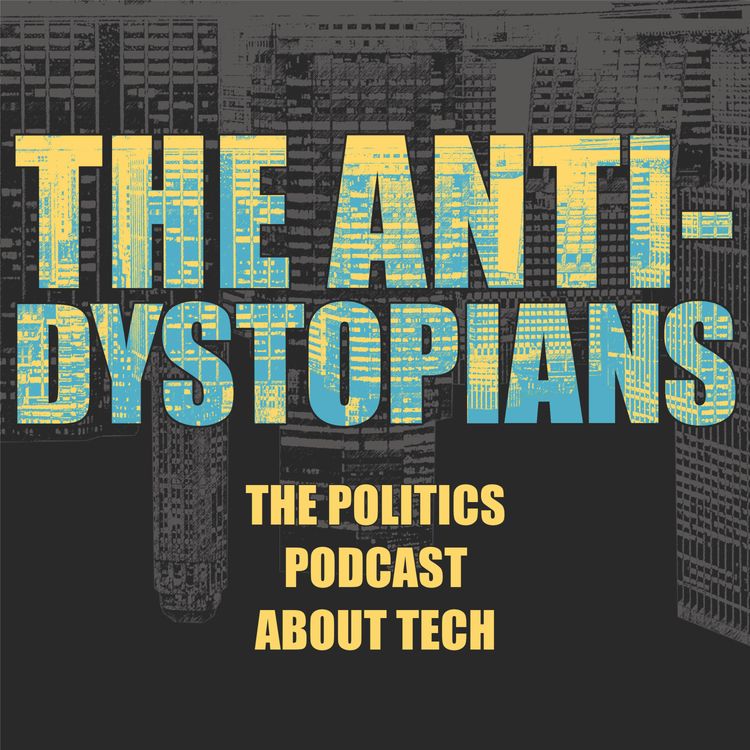Share

The Anti-Dystopians
Grab ‘em by the data: gender, technology and systems of oppression
On this week’s episode, Alina Utrata talks to Stefanie Felsberger, a PhD in Gender Studies at Cambridge University, and Muskan Shafat, an MS in Data and Society at the London School of Economics, about gender and technology. They discuss the myth of neutral tech, how technology is embedded in systems of oppression, why using a dishwasher isn’t considered “technological innovation” and whether some AI is just machine learning for eugenics.
You can follow Stefanie Felsberger on Twitter @Flsbrgr, Muskan Shafat @muskanmaraz, Alina Utrata @alinautrata and the Anti-Dystopians podcast on Twitter @AntiDystopians. Or sign up for the AD email newsletter: bit.ly/3kuGM5X
All episodes of the Anti-Dystopians are hosted and produced by Alina Utrata, and are freely available to all listeners. To support the production to the show, visit: bit.ly/3AApPN4
Books mentioned in the podcast:
Race After Technology by Ruha Benjamin
Algorithms of Oppression by Safiya Noble
Programmed Inequality by Mar Hicks
Weapons of Math Destruction by Cathy O’Neill
What Tech Calls Thinking by Adrian Daub
Nowhere Land by Kevin MacLeod
Link: https://incompetech.filmmusic.io/song/4148-nowhere-land
More episodes
View all episodes

1. "We Cannot Rely on Five Nerds": AI Urbanism from Amazon Go to Tech Sovereignty
01:19:00||Season 6, Ep. 1In this episode of the Anti-Dystopians, Alina Utrata talks to Casey Lynch, the Ramon y Cajal researcher in the Department of Geography at the University of Girona. Casey is a human geographer with interests in digital, political, urban, and labour geographies, as well as geographic thought and critical theory. They discussed that SNL skit about “Just Walk Out” Amazon Go stores, and why automated shopping never got off the ground; what iBuyer programmes are and if an AI can replace your real estate agent; and promising ideas about technological sovereignty and local community in Barcelona, so that we don’t just have to rely on “five nerds” all the time. For a complete reading list from the episode, check out the Anti-Dystopians substack at bit.ly/3kuGM5X.You can follow Alina Utrata on Bluesky at @alinau27.bsky.socialAll episodes of the Anti-Dystopians are hosted and produced by Alina Utrata and are freely available to all listeners. To support the production of the show, subscribe to the newsletter at bit.ly/3kuGM5X.Nowhere Land by Kevin MacLeodLink: https://incompetech.filmmusic.io/song/4148-nowhere-landLicense: http://creativecommons.org/licenses/by/4.0/
13. A World of VCs in Miniature: Silicon Valley's Ideology
01:01:41||Season 5, Ep. 13On this episode, Alina Utrata talks to Olivier Jutel, a lecturer at the University of Otago and an expert in cyberlibertarianism. They discuss the ideology of many technology industry elites and the strange political ideas permeating through Silicon Valley. What makes these Sand Hill Road venture capitalists different from the East Coast banking establishment? Why are they imagining a world of venture capitalists in miniature? How does this relate to the Network State treatisie? Can you really “exit” or “LARP” a country into existence? And is this all just capitalism, or something else?For a complete reading list from the episode, check out the Anti-Dystopians substack at bit.ly/3kuGM5X.You can follow Alina Utrata on Bluesky at @alinau27.bsky.socialAll episodes of the Anti-Dystopians are hosted and produced by Alina Utrata and are freely available to all listeners. To support the production of the show, subscribe to the newsletter at bit.ly/3kuGM5X.Nowhere Land by Kevin MacLeodLink: https://incompetech.filmmusic.io/song/4148-nowhere-landLicense: http://creativecommons.org/licenses/by/4.0/
12. But Daddy, I Love Him (My ChatGPT Boyfriend): Robots and Loveability
59:53||Season 5, Ep. 12Alina Utrata talks to Dr Jenny Carla Moran, a Postdoctoral Research Fellow based at the Trinity Long Room Hub and a faculty member at TCD-TU Dublin Joint Centre for the Sociology of Humans and Machines. They discuss Jenny's research about robots and loveability. Why are so many people falling in love with ChatGPT partners? What does the trope of "true love's first kiss" show us about which robots are considered human? How does society proscribe the acceptable limits of love in both gendered and racial ways (or why men can only cry at football games)? What's the problem with apologizing to your hairbrush when you drop it? And, most importantly, do you remember Spongebob Square Pants's underwater computer robot wife?For a complete reading list from the episode, check out the Anti-Dystopians substack at bit.ly/3kuGM5X.You can follow Alina Utrata on Bluesky at @alinau27.bsky.socialAll episodes of the Anti-Dystopians are hosted and produced by Alina Utrata and are freely available to all listeners. To support the production of the show, subscribe to the newsletter at bit.ly/3kuGM5X.Nowhere Land by Kevin MacLeodLink: https://incompetech.filmmusic.io/song/4148-nowhere-landLicense: http://creativecommons.org/licenses/by/4.0/
11. FROM THE ARCHIVE: The eye of the tiger: conservation tech, rural surveillance & the patriarchy in Indian wildlife reserves
48:31||Season 5, Ep. 11FROM THE ARCHIVE: In this episode, Alina Utrata talks to Dr Trishant Simlai, a conservation researcher studying the politics and geographies of wildlife conservation in India, who just received his PhD in the Department of Geography at Cambridge. They discuss wildlife surveillance in the Corbett Tiger Reserve, as well as conservation’s colonial origins, how camera traps can be used to uphold the patriarchy, and when workplace surveillance technologies literally lead to tiger attacks.All episodes of the Anti-Dystopians are hosted and produced by Alina Utrata and are freely available to all listeners. To support the production to the show, visit: bit.ly/3AApPN4Nowhere Land by Kevin MacLeodLink: https://incompetech.filmmusic.io/song/4148-nowhere-landLicense: http://creativecommons.org/licenses/by/4.0/
10. Why Finance Guys Are Trying to Offshore the Planet
01:00:58||Season 5, Ep. 10On this episode, Alina Utrata talks to Connor O'Brien, a PhD Candidate at University of Cambridge researching a conceptual history of good governance and sovereign debt. They discussed a little-known tool for climate finance called "debt for nature swaps". While they might sound nice, they're actually an insidious tactic of finance guys taking control of government policies amidst the green energy transition. But also they discussed how these financial tools also show more broadly the power of international financial regimes and their relationship to state sovereignty, local power and control and authoritarian or private power. For a complete reading list from the episode, check out the Anti-Dystopians substack at bit.ly/3kuGM5X.You can follow Alina Utrata on Bluesky at @alinau27.bsky.socialAll episodes of the Anti-Dystopians are hosted and produced by Alina Utrata and are freely available to all listeners. To support the production of the show, subscribe to the newsletter at bit.ly/3kuGM5X.Nowhere Land by Kevin MacLeodLink: https://incompetech.filmmusic.io/song/4148-nowhere-landLicense: http://creativecommons.org/licenses/by/4.0/
9. From the Archive: Nationalize Gmail!!!
57:30||Season 5, Ep. 9FROM THE ARCHIVE: Alina Utrata talks with Josh Lappen, a fellow Californian and environmental historian researching at Oxford University, who studies some of the most important technology there is: critical infrastructure. They discuss why hundreds of Elon Musks can’t (and won’t) solve climate change, the government funding and politics behind many technology entrepreneurs’ businesses, why low-tech solutions and indigenous practices are critical sources of knowledge, and the surprising number of technological innovations enabled by the US Postal Service (including Amazon’s e-commerce business and commercial flight). Plus, is PG&E really the worst company, what’s going on with the Texas blackouts, and should the government give you an email (and a bank account)?For a complete reading list from the episode, check out the Anti-Dystopians substack at bit.ly/3kuGM5X.You can follow Alina Utrata on Bluesky at @alinau27.bsky.socialAll episodes of the Anti-Dystopians are hosted and produced by Alina Utrata and are freely available to all listeners. To support the production of the show, subscribe to the newsletter at bit.ly/3kuGM5X.Nowhere Land by Kevin MacLeodLink: https://incompetech.filmmusic.io/song/4148-nowhere-landLicense: http://creativecommons.org/licenses/by/4.0/
8. On Dystopia, Fearing the Future and Political Imagination
01:17:43||Season 5, Ep. 8This week, the Anti-Dystopians talks to an expert in dystopia! Matthew Cole is a scholar of political theory and an Assistant Professor of Humanities and Social Sciences Binghamton University. His book “Fear the Future: Dystopia and Political Imagination in the 20th century” explores the history of dystopian thinking and why so many dystopian books have captured our political imagination (or indeed, accurately predicted our political future). We discuss the history of utopianism and dystopianism, whyy the emerged so prominently in the 20th century, and how dystopian literature and slogans (from “Make Atwood Fiction Again” to “1984 Was Not an Instruction Manual”) have come to characterize today’s political resistance movements. For a complete reading list from the episode, check out the Anti-Dystopians substack at bit.ly/3kuGM5X.You can follow Alina Utrata on Bluesky at @alinau27.bsky.socialAll episodes of the Anti-Dystopians are hosted and produced by Alina Utrata and are freely available to all listeners. To support the production of the show, subscribe to the newsletter at bit.ly/3kuGM5X.Nowhere Land by Kevin MacLeodLink: https://incompetech.filmmusic.io/song/4148-nowhere-landLicense: http://creativecommons.org/licenses/by/4.0/
7. An Intellectual History of LLMs
01:21:29||Season 5, Ep. 7In this episode, Alina Utrata interviews Amira Moeding, a PhD Candidate in History at the University of Cambridge where they held fellowships with Cambridge Digital Humanities and the Cluster of Excellence “Matters of Activity” at Humboldt Universität zu Berlin. They talked all about Amira’s research on the intellectual history of Large Language Models, and other types of AI. They began by asking: why is it so shocking to begin with a history and philosophy of linguistics when talking about LLMs? Why did IBM want these natural language processors to be so energy intensive (hint: to make money)? What is machine empiricism, how does it relate to the invention of Big Data, and why does it limit the way we see and understand the world around us? Amira has worked on critical theory, philosophy of science, feminist philosophy, post-colonial theory and the history of law in settler colonial contexts before turning to data and Big Data, and their paper “Machine Empiricism” together with Professor Tobias Matzner is forthcoming. Until June they were employed as an Research Assistant at the Computer Science Department (Computerlab) at the University of Cambridge in this project. For a complete reading list from the episode, check out the Anti-Dystopians substack at bit.ly/3kuGM5X.You can follow Alina Utrata on Bluesky at @alinau27.bsky.socialAll episodes of the Anti-Dystopians are hosted and produced by Alina Utrata and are freely available to all listeners. To support the production of the show, subscribe to the newsletter at bit.ly/3kuGM5X.Nowhere Land by Kevin MacLeodLink: https://incompetech.filmmusic.io/song/4148-nowhere-landLicense: http://creativecommons.org/licenses/by/4.0/
6. Abolish AI!!: Decomputing with Dan McQuillan
01:20:29||Season 5, Ep. 6On this episode of the Anti-Dystopians, Alina Utrata talks to Dan McQuillan, a senior lecturer in Critical AI at Goldsmiths University and the author of "Resisting AI: An Anti-Fascist Approach to Artificial Intelligence.” They talk about the state of AI adoption in the UK since our last conversation (spoiler alert: it’s bad), why the Starmer government so obsessed with AI, how AI is harming the environment and the planet and papering over the degradation of public services, infrastructure and community. Most notably, they discuss Dan’s concept of ‘decomputing’ and how communities can resist the adoption of AI to build communities of care — and why we should just abolish AI.For a complete reading list from the episode, check out the Anti-Dystopians substack at bit.ly/3kuGM5X.You can follow Alina Utrata on Bluesky at @alinau27.bsky.socialAll episodes of the Anti-Dystopians are hosted and produced by Alina Utrata and are freely available to all listeners. To support the production of the show, subscribe to the newsletter at bit.ly/3kuGM5X.Nowhere Land by Kevin MacLeodLink: https://incompetech.filmmusic.io/song/4148-nowhere-landLicense: http://creativecommons.org/licenses/by/4.0/